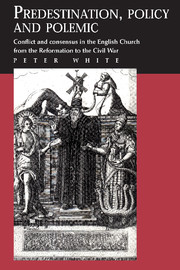 Predestination, Policy and Polemic
Predestination, Policy and Polemic Published online by Cambridge University Press: 11 September 2009
Beza's doctrine of predestination
Romanist polemic, then, condemned Protestants for making God the author of sin. Protestants in their turn accused not only papists, but any of their own number whose sails they thought too heavily trimmed to the winds of that polemic, of Pelagianism. There would be less reason to rake over the embers of their quarrels if fewer historians, at any rate of the English Church, did not accept at least the Protestant side of that polemic. The Arminians are accordingly said to have taught ‘the free-will of all men to win salvation’; and that they denied the doctrine of predestination has become at any rate an undergraduate orthodoxy. Predestination itself is assumed to be, if not the invention of John Calvin, at any rate the defining characteristic of Calvinism. It is therefore necessary to repeat that all parties to the theological debate accepted the doctrine of predestination: it was after all integral to both the Old and New Testaments, and fundamental to the teaching of St Paul. Arminianism was nothing if not a doctrine of predestination. An attempt will be made to explain the theological issues at stake, first by examining the theology of Theodore Beza. Beza's teaching became normative for late sixteenth-century Calvinists, and Arminianism was conceived as a direct response to Beza's doctrine.
Beza's teaching on predestination is associated especially with his Tabula praedestinationis of 1555, the book which contained his influential diagram of the order of predestination, later adapted by William Perkins (see figure 1). According to that work, predestination was the summa totius Christianismi.
To save this book to your Kindle, first ensure no-reply@cambridge.org is added to your Approved Personal Document E-mail List under your Personal Document Settings on the Manage Your Content and Devices page of your Amazon account. Then enter the ‘name’ part of your Kindle email address below. Find out more about saving to your Kindle.
Note you can select to save to either the @free.kindle.com or @kindle.com variations. ‘@free.kindle.com’ emails are free but can only be saved to your device when it is connected to wi-fi. ‘@kindle.com’ emails can be delivered even when you are not connected to wi-fi, but note that service fees apply.
Find out more about the Kindle Personal Document Service.
To save content items to your account, please confirm that you agree to abide by our usage policies. If this is the first time you use this feature, you will be asked to authorise Cambridge Core to connect with your account. Find out more about saving content to Dropbox.
To save content items to your account, please confirm that you agree to abide by our usage policies. If this is the first time you use this feature, you will be asked to authorise Cambridge Core to connect with your account. Find out more about saving content to Google Drive.